- Home
- John Jakes
Love and War: The North and South Trilogy Page 17
Love and War: The North and South Trilogy Read online
Page 17
Wide awake and excited, Ambrose wanted to discuss the incident. Charles held a scrap of rag to his nose until the bleeding stopped, then insisted they turn in. He was spent. Barely asleep, he bolted up again.
“What in the name of God—”
The nature of the noise registered. Men, right outside, singing “Camptown Races” loudly enough for Richmond to hear it.
“They’re serenading you, Charlie,” Ambrose whispered. “Your own boys. If you don’t go out and listen, they’ll be insulted.”
Groggy and skeptical, Charles pushed the tent flap aside, then shivered with an unexpected emotional reaction to the tribute. A wind had sprung up, blowing from the direction of the seacoast. The mist was gone and the moon was visible; so were faces he recognized. The men must have heard of the thief’s capture. They were honoring him in a traditional way.
Some were honoring him, he amended; he counted eleven.
Ambrose danced up and down like a boy, breaking out his flute to accompany the singers. Over his shoulder, Charles said, “They’ll expect the usual reward for a serenade. Haul out our private stock of whiskey, will you?”
“Glad to, Charlie. Yes, indeed.”
The men liked him for a change. While it lasted, he might as well enjoy it.
23
ON JULY 1, A MONDAY, George arrived in Washington. He checked into his hotel, then took a hack to an area of huge homes set far apart on large lots. The driver pointed out the residence the Little Giant had occupied for such a short time. Stephen Douglas had died in June, strongly supporting the President he had opposed as a candidate last year.
Housing was scarce in Washington. Stanley and Isabel had been fortunate to hear of an ailing widow no longer able to keep up her home. She packed off to live with a relative, and Stanley signed a year-long lease. He had provided this information and the address in a recent note so stiffly worded that George felt sure Cameron had insisted Stanley write it for purposes of departmental harmony. Why had the old bandit meddled? George thought irritably. The note had forced this response—a duty call with all the charm of a tumbril ride in the French Revolution.
“Mighty fine place,” the hackman called as they drove up. “Mighty fine” hardly covered it. Stanley’s home, like those nearby, was a mansion.
A butler informed him that Mr. and Mrs. Hazard were in New England. The servant had a snide and condescending manner. Maybe Isabel gives them demonstrations, George thought with cheerful spleen.
Inside, he spied unopened packing crates. Evidently they had just moved in. George left his card and jumped in the hack again, smiling. No need to call a second time; not this trip.
He ate alone in the hotel dining room, where he overhead some speculative talk about old General Patterson, said to be ready to march from Harpers Ferry into the Shenandoah. In his room, George tried to read the latest Scientific American but couldn’t concentrate. He felt nervous about the interviews scheduled for next morning.
At half past nine, he arrived at the five-story Winder Building on the corner of Seventeenth Street across from President’s Park. The original brick had been brightened up by a coat of plaster and an ironwork balcony on the second floor. George studied this and found it wanting in style. He couldn’t manufacture every piece of iron in America, but he often wished he could.
He moved past sentries on duty to protect the important government officials headquartered here; one was General Scott. Entering the building was like diving under the sea on a sunny day. Going up the gloomy iron stairs, he noticed the bad state of the woodwork and paint peeling everywhere.
Civilians with portfolios or rolled-up plans packed the benches in the second-floor corridor. Clerks and uniformed men traveled from doorway to doorway on mysterious errands. George stopped a captain and was directed through another door into a stone-floored office of appalling disorder. At rows of desks, other clerks wrote or shuffled papers. Two lieutenants argued over a clay model of a cannon.
George and Wotherspoon had found the flaw in the casting process, and organization of the bank was proceeding smoothly, so he had a clear conscience about this visit—though at the moment he had a wild urge to flee.
A middle-aged officer approached, radiating importance. “Hazard?” George said yes. “The chief of Ordnance is not here as yet. I am Captain Maynadier. You may sit and wait—there, next to Colonel Ripley’s desk. I regret I have no time to chat. I have been in this department fifteen years and have never once caught up with my paperwork. Paper is the curse of Washington.”
He waddled off and went exploring among several mountains of it landscaping his desk. Someone had told George that Maynadier was an Academy man. Though all West Point graduates were supposed to be brothers, friends, George would be happy to make an exception.
He took a chair. After twenty minutes, he heard shouting in the hall.
“Colonel Ripley!”
“If you’ll only give me a moment—”
“May I show you this—?”
“Han’t got time.”
The irascible voice preceded an equally irascible lieutenant colonel, a sharp-featured old fellow from Connecticut, Academy class of ’14. The chief of the Ordnance Department carried his official burdens and his sixty-six years with notable displeasure.
“Hazard, is it?” he barked as George rose. “Han’t got much time for you, either. Do you want the job or not? Carries the rank of captain till we can get you a brevet. All my officers need brevets. Cameron wants you in here, so I guess it’s cut and dried if you say yes.”
Hat and dress gauntlets were slapped on the desk during the foregoing. Ripley’s verbal tantrum would have been funny to anyone not connected with the department—or thinking of being connected. A distinct silence—fear?—had descended on the high-ceilinged room the moment Ripley entered.
“Sit down, sit down,” the colonel said. “The Hazard works has a contract from this department, don’t it?”
“Yes, sir. We’ll meet it on schedule.”
“Good. Better than a lot of our suppliers can say. Well, ask me questions. Talk. We’re due in the park in half an hour. The secretary wants to see you, and since he’s the one who put me in this job two months ago, I reckon we’ll go.”
“I do have one important question, Colonel Ripley. You know I’m an ironmaker by trade. How would that help me fit in here? What would I do if I worked for you?”
“Supervise artillery contracts, for one. You also run a huge manufactory, which I presume takes organizational skill. We can use it. Look at the mess I inherited,” he cried with a sweeping gesture. Maynadier, whose desk was adjoining, renewed his attack on the paper peaks with a haste approaching frenzy.
“I’d welcome your presence, Hazard—long as you don’t bother me with newfangled proposals. Han’t got any time for those. Tested weapons are the best weapons.”
Another Stanley. Foursquare against change. That was a definite negative. George began to understand why the colonel’s critics called him Ripley Van Winkle.
They discussed pay and how soon he could report—details he considered secondary. He was in a mood as sour as Ripley’s when the colonel consulted a pocket watch and proclaimed them two minutes late to meet Cameron.
Out they dashed through the barricades of bodies. Several contract seekers followed Ripley downstairs, shrill as gulls chasing a fishing boat. One man, yelling about his “remarkable centrifugal gun” that would hurl projectiles “with the fury of a slingshot,” knocked George’s hat off with brandished plans.
“Inventors,” Ripley fumed as he crossed the avenue. “Ought to ship every last one back to the madhouses they came from—”
Another innovation no doubt infuriating to the colonel floated above the trees of President’s Park. Guy ropes secured its empty observation basket to the ground. George recognized Enterprise, the balloon featured in last month’s illustrated papers. It had been exhibited in this same location not many days ago, and Lincoln was said to have been interes
ted in its potential for aerial observation of enemy troops.
The balloon fascinated George because he had seen only one other, at a Bethlehem fair. Enterprise was made of colorful gored sections of pongee, the whole filled with hydrogen. Farther back in the trees, beyond the crowd of mothers, children, government officials, and a few blacks, he saw the wagon with wooden tanks in which sulphuric acid and iron filings combined to produce the gas.
Ripley paraded through the crowd in a manner that said he was a person of authority. They found Simon Cameron talking with a thirtyish fellow in a long linen coat. Before introductions could be finished, the young man pumped George’s hand.
“Dr. Thaddeus Sobieski Constantine Lowe, sir. An honor to meet you! Though I’m from New Hampshire, I know your name and high standing in the world of industry. May I describe my plan for an aerial spy corps? I hope interested citizens will support it so the commanding general will be persuaded—”
“General Scott will give the scheme due consideration,” Cameron broke in. “You needn’t arrange any more exhibitions of this kind.” Behind the smile of the old pol lay a hint that they wouldn’t be tolerated on government land, either. “If you will excuse me, Doctor, I have business to discuss with our visitor.”
And he drew George away as if they had always been political partners, not opponents. Ripley dogged them as they strolled.
“Have a good chat with the colonel, George?”
“I did, Mr. Secretary.”
“Simon. We’re old friends. Look here—I know you and Stanley don’t always get along. But this is wartime. We have to set personal matters to one side. I never think of the past. Who worked and voted against me back home and who didn’t—” After that sly dig, Cameron began to preach. “Ripley urgently needs a man for artillery procurement. Someone who understands ironmakers, who talks their language—”
He faced George, squinting against the hot July light. “Unless we wish to see this nation fail, we must all shoulder part of the burden of preserving it.”
Don’t spout homilies at me, you damned crook, George thought. At the same time, curiously, he responded to the appeal. The words were true, even if the man wasn’t.
Ripley harrumphed, intruding. “Well, Hazard? Any decision?”
“You’ve been very forthcoming with practical information about the job, sir. But I’d like the rest of the day to consider everything.”
“Only fair,” Cameron agreed. “I look forward to hearing from you, George. I know your decision will be good news.” Once again he clapped the visitor on the shoulder, then rushed off.
The fact was, George had already decided. He would come to Washington, but he would bring a load of reservations as baggage. He didn’t feel noble, merely foolish and, consequently, a little depressed.
Ripley whirled at the sound of a commotion—Dr. Lowe chasing some urchins from beneath the bobbing balloon basket. “Han’t got time for such nonsense in wartime,” Ripley complained as they left President’s Park. Whether he meant balloons or children, George didn’t bother to ask.
Later that day, George hired a horse and rode across the Potomac, following directions Brett had provided. He couldn’t find Captain Farmer’s pick-and-shovel company. Since business required that he take a 7:00 P.M. train, he reluctantly turned back. All around the fortifications he saw fields of tents and men drilling. It reminded him of Mexico, with one difference: the soldiers obliquing or clumsily marching to the rear were so young.
24
SEVERAL DAYS LATER IN the mansion on I Street, Isabel took tea in a room she had claimed for herself during their first inspection of the house. For one hour, starting at four, she forbade anyone to disturb her while she sipped and read the newspapers.
It was a daily ritual, and one she considered vital to success in this labyrinthine city. A quick study, Isabel already knew certain fundamentals of survival. It was better to be devious than forthright. Never reveal one’s true opinion; the wrong person might hear it. A sensitivity to shifting power balances was also important. Stanley was about as sensitive as a wheel of cheese; so his wife, a step removed from the daily activities of the government, relied on newspapers. One could learn only so much at balls, receptions, and salons—or from Stanley.
Today she discovered the reprinted text of the President’s Independence Day message to Congress. It was largely a reiteration of the causes of the war. Lincoln put all the blame on the South, naturally, and stated again that the Confederacy hadn’t really needed to take Fort Sumter for any strategic reason. Hotheads had created a false issue of patriotic pride, and as a consequence, the South was rashly testing whether a constitutional republic, or a democracy—a government of the people, by the same people—can, or cannot, maintain its territorial, integrity against its own foes.
Isabel loathed the apelike Westerner, but never more so than when she read his declaration that he was seeking the legal means for making this contest a short, and a decisive one.
Legal, when he had just asked Scott to suspend habeas corpus in certain military districts between Washington and New York? The man’s pronouncements were twaddle. He was already behaving like an emperor.
Two sections of the message did please her. Although Lincoln hoped for a short war, he had asked Congress to place four hundred thousand men at his disposal. Isabel saw eight hundred thousand Jefferson boots.
Further, the President didn’t spare the military academies:
It is worthy of note that in this, the government’s hour of trial, large numbers of those in the army and navy who have been favored as officers have resigned and proved false to the hand which had pampered them.
Splendid. When her egotistical brother-in-law arrived, perhaps she could make capital of the rising anti-West Point sentiment. News that George would be coming to town had been waiting when she and Stanley returned from New England. She had also learned that he had called at the mansion, a sham courtesy resulting from Cameron’s insistence that Stanley write a conciliatory note welcoming the brother who had once knocked him down. The whole incident infuriated her.
George remained a West Point loyalist, but many influential people wanted the institution abolished. Most with that goal belonged to a new clique that was forming: an alliance of senators, congressmen, and cabinet officers from the extreme pro-abolition wing of the Republican party. Kate Chase’s father belonged, it was said; so did the clubfooted old wreck from Isabel’s home state, Congressman Thad Stevens. How she would use this information to hurt George was still nebulous. But use it she would.
Isabel had been watching the new radical clique slowly coalesce. She already knew certain facts, one of the most important being that the foxy Mr. Cameron carried no weight with the group.
The radicals favored an aggressive war and harsh terms when it was won. Lincoln held different views on the war and on slavery. He didn’t want all the Negroes freed to rampage and rape and rob white men of jobs. Neither did Isabel. But that wouldn’t prevent her from cultivating the wives of the radicals if doing so offered some advantage.
At dinner that evening, she brought up Lincoln’s message. “He is saying exactly the same thing we’ve heard from certain congressmen. West Point trained traitors at public expense and should be closed. That sentiment might be useful against your brother.”
Stanley’s unusual good cheer infuriated her—he had been grinning ever since he got home—and so did his obtuse, “Why should I want to hurt George now?”
“Have you forgotten all of his insults? And those of his wife?”
“No, of course not, but—”
“Suppose he comes here and starts asserting himself in that pushy way of his?”
“What if he does? Ordnance reports to the War Department. I outrank him. And I’m close to Simon, don’t forget.”
Did the fool believe that was a safe spot? Before she could snap at him, he continued, “Enough about George. I received two pieces of good news in today’s mail. Those attorneys we hired
in Lynn—absolute charlatans, but they reached and paid off the right people. The property transfer will be pushed through quickly. I heard from Pennyford, too. He’ll have the factory ready for double-shift operation within the month—and no problem about help. There are two or three applicants for every job. We can hire children even more cheaply.”
“How wonderful,” she sneered. “We have everything we need. Except a contract.”
He shot his hand into his pocket. “We have that, too.”
Isabel was seldom speechless, but she was now. Stanley handed her the ribbon-bound document as if he had captured it in battle. “How—very fine.” She said it weakly because she didn’t mean it; he had obtained the contract on his own. Was this city or his job somehow changing him into what he had never been before? A real man? The mere possibility was profoundly upsetting.
25
SERBAKOVSKY WAS DEAD.
In the first week of July, fellow officers laid him in a coffin of raw yellow pine. Two bearded men in heavily braided uniforms appeared with a wagon and civilian driver. The Russians, who spoke only rudimentary English, carried safe-conduct papers signed by Union as well as Confederate authorities. The ease with which they had traveled from Washington in response to a courier message confirmed something Charles had heard repeatedly: going through the lines in either direction was not hard.
The blithe prince, who had missed death on so many battlefields, had been killed by a child’s disease. It was killing soldiers in epidemic numbers. Victims got up too soon, thinking themselves over the measles, and relapsed into fatal fevers. The surgeons seemed helpless.
The wagon creaked away into the hot dusk, and Ambrose and Charles went to the sutler’s to get drunk. After four rounds, Ambrose insisted on buying copies of The Richmond Songster, one of many such compilations being sold throughout the army. Charles put the songbook in his pocket and noticed a black smear on his thumbs. Damp ink. Everything was speed and opportunism these days.

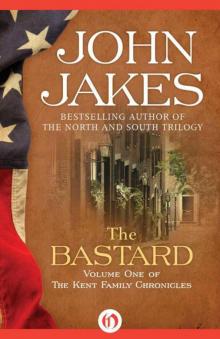 The Bastard
The Bastard The Furies
The Furies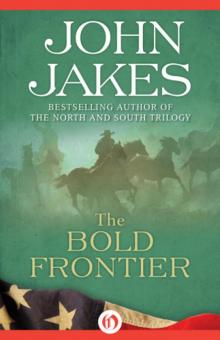 The Bold Frontier
The Bold Frontier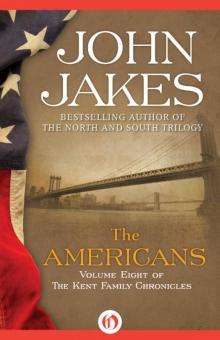 The Americans
The Americans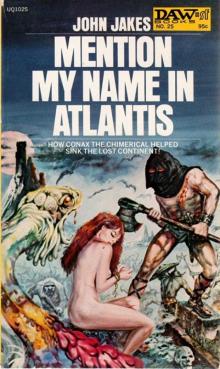 Mention My Name in Atlantis
Mention My Name in Atlantis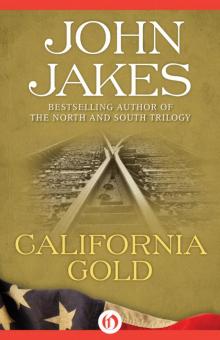 California Gold
California Gold North and South
North and South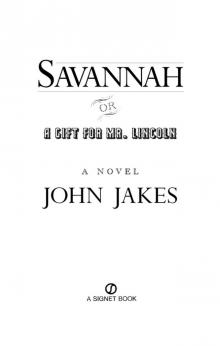 Savannah, or a Gift for Mr. Lincoln
Savannah, or a Gift for Mr. Lincoln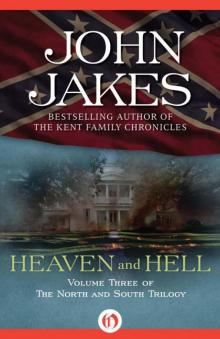 Heaven and Hell
Heaven and Hell Homeland
Homeland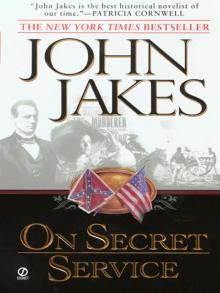 On Secret Service
On Secret Service The Lawless
The Lawless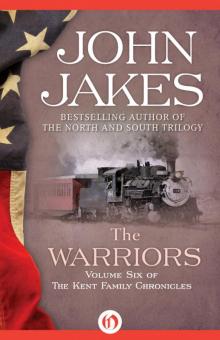 The Titans
The Titans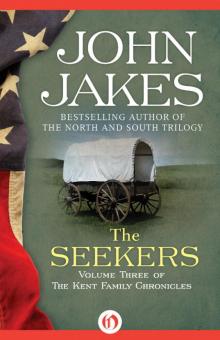 The Seekers
The Seekers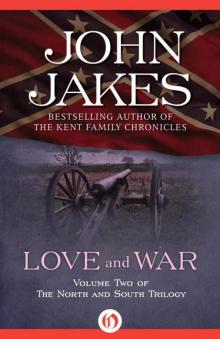 Love and War
Love and War North and South: The North and South Trilogy (Book One)
North and South: The North and South Trilogy (Book One)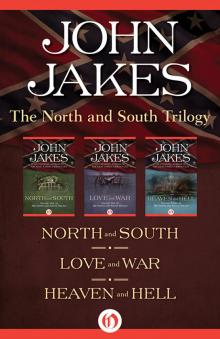 North and South Trilogy
North and South Trilogy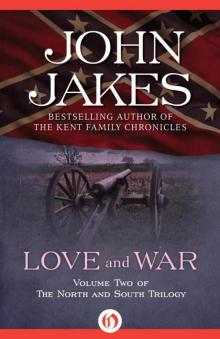 Love and War: The North and South Trilogy
Love and War: The North and South Trilogy North and South: The North and South Trilogy
North and South: The North and South Trilogy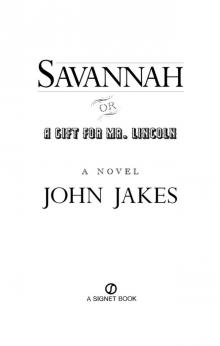 Savannah
Savannah Lawless
Lawless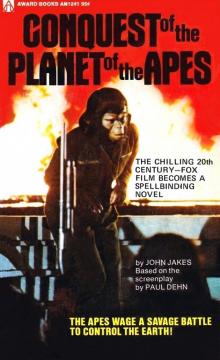 Conquest Of The Planet Of The Apes
Conquest Of The Planet Of The Apes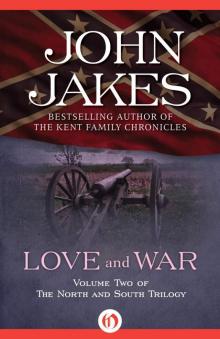 Love and War: The North and South Trilogy (Book Two)
Love and War: The North and South Trilogy (Book Two)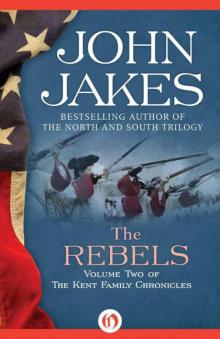 The Rebels: The Kent Family Chronicles
The Rebels: The Kent Family Chronicles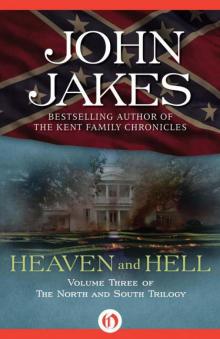 Heaven and Hell: The North and South Trilogy
Heaven and Hell: The North and South Trilogy Planet of the Apes Omnibus 2
Planet of the Apes Omnibus 2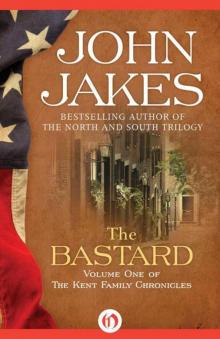 The Bastard: The Kent Family Chronicles
The Bastard: The Kent Family Chronicles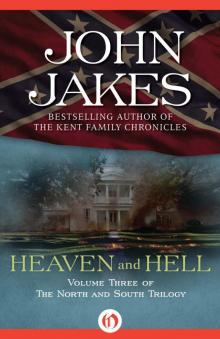 Heaven and Hell: The North and South Trilogy (Book Three)
Heaven and Hell: The North and South Trilogy (Book Three)